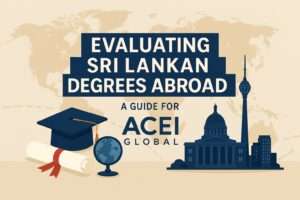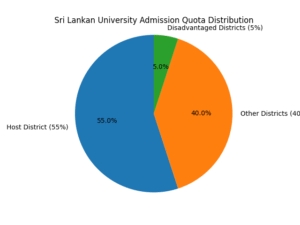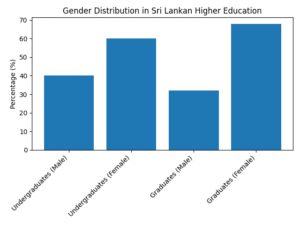
Studying or working overseas can unlock life-changing opportunities, but first, your Sri Lankan degree needs to be recognized and accepted by foreign institutions and employers. Because Sri Lanka’s university system is both competitive and complex, graduates often face questions about whether their coursework meets international standards. Professional evaluations translate your degree into an equivalency that universities, licensing boards, and employers around the world can recognise, ensuring that your hard‑earned qualifications carry the weight they deserve.
Why Evaluation Matters
An accurate credential evaluation helps you avoid delays and rejections when applying to study or work abroad. Universities compare your transcripts to their entry requirements to determine whether you meet academic standards; employers rely on official reports to verify that your qualifications are comparable to local degrees; licensing boards need proof that your program meets professional benchmarks; and immigration officials look for clear documentation when processing study visas or skilled‑worker applications. Although experience will become more important as your career progresses, getting an independent evaluation early on is essential to opening those doors.
The University Grants Commission (UGC) controls entry to Sri Lanka’s fifteen public universities and eighteen institutes through a quota system. Fifty‑five percent of places are reserved for students from the host district, forty percent for students from other districts, and only five percent for disadvantaged districts. Competition is fierce — in 2012, only 17 percent of students who passed the General Certificate of Education Advanced Level exam were admitted to university, meaning relatively few Sri Lankans hold degrees. This scarcity makes proper evaluation and attestation even more important when you apply abroad, because admissions officers and employers need a clear picture of what your credentials represent.

Step‑by‑Step Evaluation Process
To ensure your Sri Lankan degree is recognised, follow this structured process:
- Collect and organise documents – Gather your original degree certificate, transcripts, provisional certificates, and detailed course syllabi. If your program lasts four years, ensure it is labeled “Bachelor (Special)” or “Bachelor Professional,” as three-year general degrees are often considered ordinary.
- Verify accreditation – Confirm that the UGC recognises your university and that professional programs are accredited by bodies such as the Institution of Engineers, Sri Lanka. Degrees from unrecognised institutions are rarely accepted abroad.
- Attest your documents – Book an appointment with the Ministry of Foreign Affairs and present your original documents along with a valid ID. Translations into English must be done by sworn translators and submitted with the originals for legalisation.
- Choose a reputable evaluator – Check with your target university or employer to see which credential evaluation agencies they accept such as ACEI Global.
- Submit your application – Create an account with the evaluator, send sealed transcripts, and pay the required fees. Processing times vary, but standard evaluations typically take approximately one week once all required documents are received.
- Receive and use your report – Order digital and sealed copies of the evaluation report to submit with admissions, licensing, and immigration applications. Keep extra copies for future use.
- Appeal if needed – If the outcome seems lower than expected, provide additional documentation or request a re‑evaluation. Some agencies allow appeals for a fee.
Key Institutions and Authorities
Within Sri Lanka, the University Grants Commission plans, coordinates, and allocates funding for higher education, ensuring that academic standards are maintained. Verifying that your program is UGC‑recognised should be your first step. The Ministry of Foreign Affairs handles attestation of educational documents for overseas use; only original certificates or official translations in Sinhala, Tamil, or English can be legalised. Outside Sri Lanka, recognised agencies such as ACEI provide an equivalency report. At the same time, professional bodies such as Engineers Australia and the UK General Medical Council rely on accredited programs when issuing licenses. Some universities conduct their own assessments or set minimum grade requirements, so always confirm which evaluators are accepted.
Sri Lanka’s higher‑education demographics also influence evaluation decisions. Among undergraduates, approximately 40 percent are men and 60 percent are women, whereas at graduation, women comprise roughly 68 percent of degree holders. Such data highlight the strides women have made in fields traditionally dominated by men; for instance, the first female Sri Lankan graduate of Memorial University’s engineering program and the first PhD graduate in precision agriculture both built on Sri Lankan credentials to achieve international recognition. Understanding these trends helps evaluators and admissions officers appreciate the broader context of your academic achievements.

Tips & Best Practices
- Start early: Begin the attestation and evaluation process three to six months before your application deadline to account for appointments and processing times.
- Confirm accepted evaluators: Each university or employer may prefer a specific credential evaluation agency; always check their requirements.
- Keep multiple certified copies: Order extra sealed transcripts and evaluation reports in case you apply to multiple institutions or licensing boards.
- Use secure delivery services: Send original documents through trackable couriers or official e‑transcript portals.
- Ensure consistent names: Your name should match exactly across all documents, including passports, degree certificates, transcripts, and translations, to avoid delays.
- Be prepared for bridging courses: Some countries may require prerequisite courses if they consider your degree partially equivalent.
- Stay updated: Monitor announcements from the UGC and professional bodies about accreditation changes or new recognition agreements.
Get Your Degree Evaluated with ACEI Global
Having your Sri Lankan degree properly evaluated is a vital step toward studying, working, or immigrating abroad. ACEI Global specializes in interpreting international credentials and providing equivalency reports that are recognized by universities, employers, and licensing bodies across the U.S., the UK, Europe, the Gulf, and Southeast Asia. With decades of expertise and membership in professional associations such as AICE and ACEI, we deliver accurate assessments and responsive customer support.
Ready to take the next step in your academic or professional journey? Contact ACEI Global today to begin your credential evaluation and ensure your Sri Lankan degree opens doors wherever your ambitions take you.
